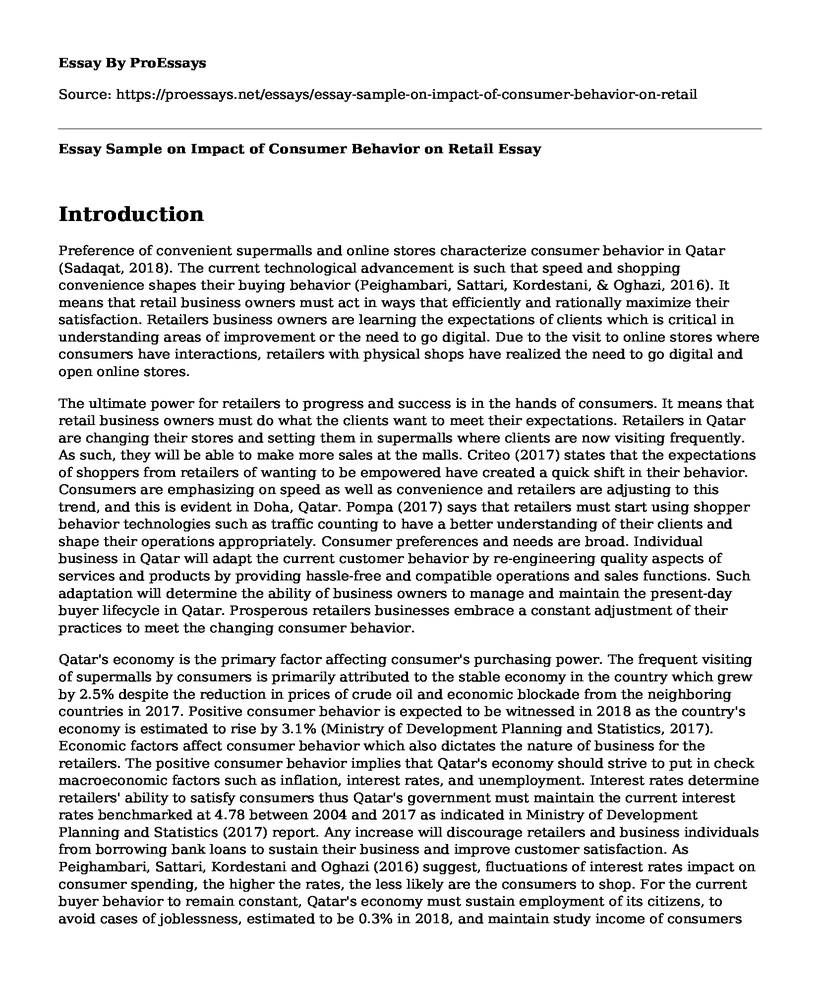Introduction
Preference of convenient supermalls and online stores characterize consumer behavior in Qatar (Sadaqat, 2018). The current technological advancement is such that speed and shopping convenience shapes their buying behavior (Peighambari, Sattari, Kordestani, & Oghazi, 2016). It means that retail business owners must act in ways that efficiently and rationally maximize their satisfaction. Retailers business owners are learning the expectations of clients which is critical in understanding areas of improvement or the need to go digital. Due to the visit to online stores where consumers have interactions, retailers with physical shops have realized the need to go digital and open online stores.
The ultimate power for retailers to progress and success is in the hands of consumers. It means that retail business owners must do what the clients want to meet their expectations. Retailers in Qatar are changing their stores and setting them in supermalls where clients are now visiting frequently. As such, they will be able to make more sales at the malls. Criteo (2017) states that the expectations of shoppers from retailers of wanting to be empowered have created a quick shift in their behavior. Consumers are emphasizing on speed as well as convenience and retailers are adjusting to this trend, and this is evident in Doha, Qatar. Pompa (2017) says that retailers must start using shopper behavior technologies such as traffic counting to have a better understanding of their clients and shape their operations appropriately. Consumer preferences and needs are broad. Individual business in Qatar will adapt the current customer behavior by re-engineering quality aspects of services and products by providing hassle-free and compatible operations and sales functions. Such adaptation will determine the ability of business owners to manage and maintain the present-day buyer lifecycle in Qatar. Prosperous retailers businesses embrace a constant adjustment of their practices to meet the changing consumer behavior.
Qatar's economy is the primary factor affecting consumer's purchasing power. The frequent visiting of supermalls by consumers is primarily attributed to the stable economy in the country which grew by 2.5% despite the reduction in prices of crude oil and economic blockade from the neighboring countries in 2017. Positive consumer behavior is expected to be witnessed in 2018 as the country's economy is estimated to rise by 3.1% (Ministry of Development Planning and Statistics, 2017). Economic factors affect consumer behavior which also dictates the nature of business for the retailers. The positive consumer behavior implies that Qatar's economy should strive to put in check macroeconomic factors such as inflation, interest rates, and unemployment. Interest rates determine retailers' ability to satisfy consumers thus Qatar's government must maintain the current interest rates benchmarked at 4.78 between 2004 and 2017 as indicated in Ministry of Development Planning and Statistics (2017) report. Any increase will discourage retailers and business individuals from borrowing bank loans to sustain their business and improve customer satisfaction. As Peighambari, Sattari, Kordestani and Oghazi (2016) suggest, fluctuations of interest rates impact on consumer spending, the higher the rates, the less likely are the consumers to shop. For the current buyer behavior to remain constant, Qatar's economy must sustain employment of its citizens, to avoid cases of joblessness, estimated to be 0.3% in 2018, and maintain study income of consumers and consequently enhance their purchasing power (Ministry of Development Planning and Statistics, 2017). Lastly, Qatar's economy must not cause any fluctuation of inflation which currently stands at 0.90 as any slight increment can lead to increase in prices inflicting adverse effects on consumer behavior and consequently retailers' businesses.
References
Ministry of Development Planning and Statistics. (2017, October). Qatar's Economic Outlook 2016-2018. Doha: Ministry of Development Planning and Statistics. Retrieved from Qatar's Economic Outlook 2016-2018: https://www.mdps.gov.qa/en/knowledge/Doc/QEO/Qatar_Economic_Outlook_2016_2018_EN.pdf
Peighambari, K., Sattari, S., Kordestani, A., & Oghazi, P. (2016). Consumer Behavior Research: A Synthesis of the Recent Literature. SAGE Journal, 6(2): 117-139. https://doi.org/10.1177/2158244016645638.
Cite this page
Essay Sample on Impact of Consumer Behavior on Retail. (2022, Apr 02). Retrieved from https://proessays.net/essays/essay-sample-on-impact-of-consumer-behavior-on-retail
If you are the original author of this essay and no longer wish to have it published on the ProEssays website, please click below to request its removal:
- Law of Financial Institutions and Securities
- Paper Example on Globalization and International Political Economy
- Basic Information About Barcelona, Spain That International Employees Should Know
- Capitalism and Real Estate Essay Example
- Congestion Pricing Practices and Public Acceptance Paper Example
- Assignment Example on Rafael Trujillo
- Transformational Leadership & Job Design Impact on Employee Wellness & Performance - Essay Sample







